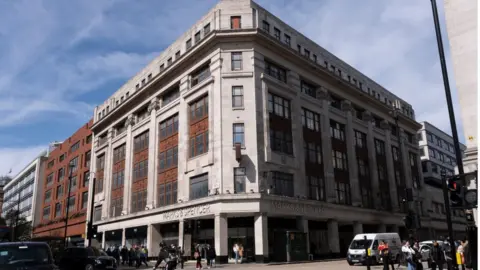Michael Gove wrongly blocked M&S Oxford Street store plans, High Court told
 Getty Images
Getty ImagesThe government "misapplied" rules to block the revamp of Marks & Spencer's flagship Oxford Street store in central London, the High Court has heard.
Michael Gove halted plans to replace the Marble Arch building with a new shop and large office block in July.
M&S' legal team told the hearing that Mr Gove's "unusual" decision should be quashed.
The government and Save Britain's Heritage say Mr Gove was entitled to make the decision he did.
M&S wants to flatten Orchard House, its store in Oxford Street, and replace it, claiming the redevelopment is "of fundamental importance" to the future of London's West End.
Mr Gove, secretary of state for levelling up, housing and communities, has previously said the building should be refurbished rather than demolished and that demolition would negatively impact nearby heritage assets, including the Grade II*-listed Selfridges store directly opposite.
M&S has brought legal action against the government, Westminster City Council and Save Britain's Heritage over the decision.
The government and Save Britain's Heritage are resisting the challenge.
M&S applied to the council in 2021 for permission to demolish Orchard House and build a nine-storey building in its place that would include retail space, a cafe, a gym and an office.
Mr Gove said in June 2022 that he would decide on the application rather than the council, which supported the plans along with the Greater London Authority.
He refused planning permission in July 2023, overruling a government planning inspector who gave his approval to the plans in February last year.
 PA Media
PA MediaThe inspector, David Nicholson, had said the building was not "suited to meeting the needs for the site" and that "meaningful refurbishment" was "unlikely", meaning demolition was the only option.
Mr Nicholson also said blocking the plans would likely lead to the store closing, which would cause "terminal" harm to the "vitality and viability of the area" and meant the benefits of the plans outweighed any harmful effects.
But while Mr Gove acknowledged it was unclear if there was "a viable and deliverable alternative" to demolition, there was no "compelling justification" for it.
In written arguments at the High Court, Paul Shadarevian KC, representing the Department for Levelling Up, Housing and Communities (DLUHC), said: "The secretary of state was entitled to say that in the circumstances of this case, there should be a strong presumption in favour of reusing buildings."
He continued: "It is abundantly apparent that the secretary of state both understood the inspector's conclusions and gave adequate reasons for disagreeing with them."
'Legally faulty misunderstanding'
But in his written arguments, Russell Harris KC, representing M&S, said this was a "legally faulty misunderstanding" of national planning policy and that "no such presumption" in favour of reusing or refurbishing buildings existed.
He also said that if demolition was not permitted, the extent of the necessary refurbishment could create the same or higher carbon emissions, and told the court the store "would close" if left in its current form due to it "significantly under trading".
The barrister said: "There is nothing more here than a general positive encouragement of the conversion of existing buildings, which itself is entirely different from the wholesale, deep refurbishment which is at issue in this case."
He added: "It has nothing that could be described as a presumption, let alone a strong presumption."
The hearing, before Mrs Justice Lieven, is due to conclude on Wednesday.

Listen to the best of BBC Radio London on Sounds and follow BBC London on Facebook, X and Instagram. Send your story ideas to [email protected]
